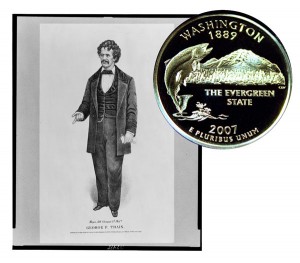Today, the Washington State Quarter Coin remembers George Francis Train beginning his trip around the world in March 1890.
Mr. Train was a flamboyant person and became well-known around the world.
The Daily Alta California newspaper ran the following story just after he began his journey around the world:
=====
GEORGE FRANCIS TRAIN.
The Story of His Famous Trial for Lunacy.
How his wit saved him.
A New York lawyer who was an eye-witness describes the remarkable scene as it occurred.
“The tour around the world in sixty days of George Francis Train, upon which he started yesterday, recalls to mind a circumstance in the career of the great crank not heretofore published,” said a New York lawyer, who is a guest at the Palace, yesterday.
“During the summer and fall of 1872, Victoria Woodhull and Tennie C. Claflin, her sister, were engaged, among other things, in publishing a paper known as Woodhull & Claflin’s Weekly.
“The paper was devoted largely to attacking private individuals, and contained, among other articles, the story of the famous Beecher-Tilton scandal, and there is no doubt that it was owing more to the articles in question than to any other circumstance, that the action by Theodore Tilton against Henry Ward Beecher for $100,000 damages was brought, and which it took six months to try, and which resulted in a disagreement of the jury.
“The articles that appeared in Woodhull & Claflin’s Weekly, and the comments on the same, were not always couched in the choicest language, and resulted in the arrest of the women and their trial for issuing an obscene publication, and it was with difficulty that they escaped conviction.
“George Francis Train at once championed their cause, and, engaging an office on Broadway, began the publication of a small sheet, which he named the Train Ligue, and which contained, principally, quotations from the Bible of a character which are never used as texts for sermons.
“He was arrested and confined in the Tombs for issuing an obscene publication.
“Mr. Phelps, the District Attorney, upon investigating the matter found that no conviction could probably be had in the case, inasmuch as the quotations were in every instance found to be correct.
“He and Anthony Comstock, President of the Society for the Suppression of Vice, at whose instigation Train had been arrested, found they had an elephant on their hands, and what to do with him they did not know.
“They were willing to have Train discharged, but he declined to leave the Tombs, where during his incarceration he wrote epigrams for the Sun.
“It was finally decided to railroad him to the lunatic asylum, and a writ de lunatico inquirendo was issued out of the Supreme Court, returnable before Judge Noah Davis.
“A jury was impaneled, and among the witnesses called on behalf of the prosecution was William A. Hammond, Ex-Surgeon General of the United States, the greatest living expert on mental diseases, who testified that he believed Train to be insane and dangerous to be at large.
“After the prosecution had rested its case. Train was called in his own defense.
“A Bible was handed him and the clerk proceeded to administer the oath. ‘Stop !’ said Train. ‘I decline to be sworn upon the Bible, on the ground that it is an obscene publication.’
“The Clerk then asked him if he would affirm by the uplifted hand.
” ‘No,’ said Train; ‘I deny the existence of a God!’
“The Court, jury, lawyers and spectators were, astounded at the impressive manner in which he said this.
” ‘What will you do, then!’ said Judge Davis.
” ‘I will tell the truth.’ answered Train.
“He then proceeded to tell the history of his life, saying that he was born in Boston; that his parents removed to New Orleans during his childhood, where they both died of yellow fever, leaving him an orphan, with no person to look after him but his grandmother, whom he praised in the highest terms.
“It was she who took him back to Boston and brought him up. He described her as having been a devout Presbyterian and a woman of culture. She was proud of her charge, and told him if he would attend to his studies, look after his morals, if he would not drink nor smoke, nor chew nor swear, he would certainly grow up to be a great man.
” ‘These precepts,” said Train, ‘I religiously followed up to my eighteenth year, when I had occasion to visit Washington, and while there naturally went to hear, in the Senate, such illustrious men as Webster and Clay and Calhoun and others, and I found upon inquiry that they smoked, they chewed, they gambled, they swore, they got drunk, they were notoriously immoral, and I cane to the conclusion that if these were great men my grandmother had humbugged me.’
“At the conclusion of his recital, which was given in a clear and impressive manner, a perfect storm of applause and laughter went up from the audience, which was quickly suppressed by the court.
“Train, however, had won his case, the jury concluding that however erratic he might be, he was not a proper subject for Bloomingdale Asylum, and they acquitted him without leaving their seats.”
=====
Mr. Train completed his around the world journey in 67 days 12 hours and 1 minute, which was became the record at the time.
The Washington State Quarter Coin shows beside a full-length portrait of George Francis Train, circa 1861.
